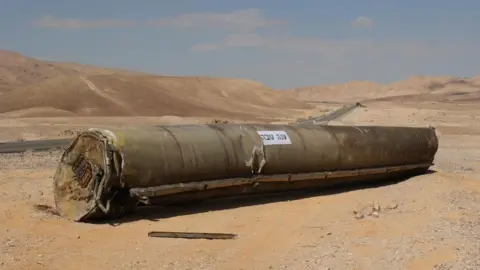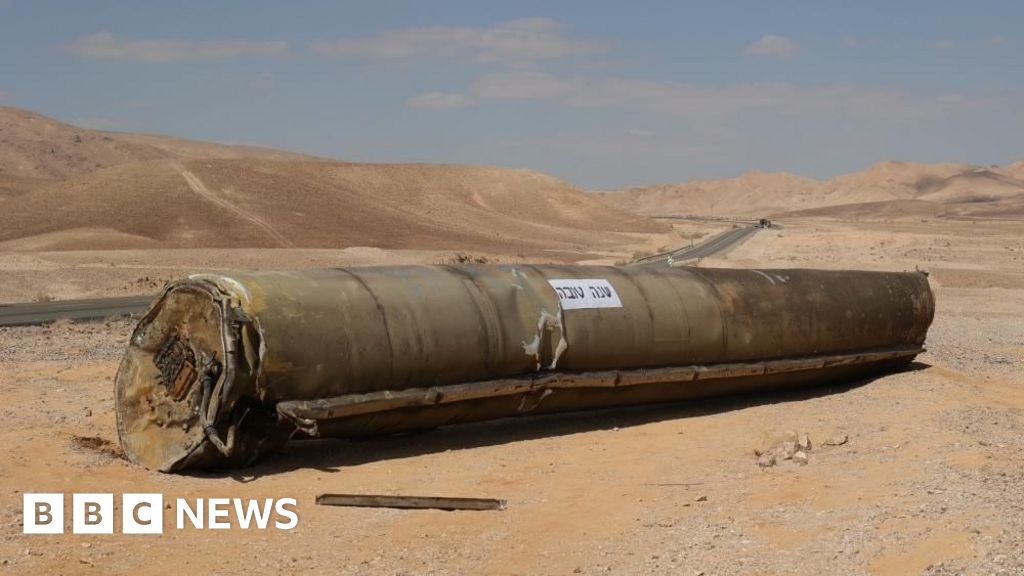 EPA
EPAUS investigators are trying to find out how a pair of highly classified intelligence documents were leaked online.
The documents, which appeared on the messaging app Telegram on Friday, contain an alleged US assessment of Israeli plans to attack Iran.
The assessment is based on interpretation of satellite imagery and other intelligence.
On Monday White House National Security Council spokesman John Kirby said President Joe Biden was “deeply concerned” about the leak.
Officials have not determined whether the documents were released due to a hack or a leak, Mr Kirby said.
For three weeks now, Israel has been vowing to hit Iran hard in retaliation for Iran’s massed ballistic missile attack on Israel on 1 October.
Iran says that was in response to Israel’s assassination of the Hezbollah leader, Hassan Nasrallah, on 27 September.
Are the documents genuine?
Military analysts say the phrasing used in the headings looks credible and is consistent with similar classified documents revealed in the past.
Headed “Top Secret”, they include the acronym “FGI”, standing for “Foreign Government Intelligence”.
The documents appear to have been circulated to intelligence agencies in the Five Eyes alliance, the five Western nations that regularly share intelligence, namely the US, UK, Canada, Australia and New Zealand.
The acronym “TK” in the documents refers to “Talent Keyhole”, a codeword covering satellite-based Signals Intelligence (SIGINT) and Imagery Intelligence (IMINT).
What do they tell us?
Taken together, the two documents are a classified US assessment of Israel’s preparations to hit targets in Iran, based on intelligence analysed on 15-16 October by the US National Geospatial-Intelligence Agency.
What features prominently is the mention of two Air Launched Ballistic Missile (ABLM) systems: Golden Horizon and Rocks.
Rocks is a long-range missile system made by the Israeli company Rafael and designed to hit a variety of targets both above and below ground. Golden Horizon is thought to refer to the Blue Sparrow missile system with a range of around 2,000km (1,240 miles).
The significance of this is that it would indicate that the Israeli Air Force is planning to carry out a similar but greatly expanded version of its ABLM attack on an Iranian radar site near Isfahan in April.
By launching these weapons from long range and far from Iran’s borders it would avoid the need for Israeli warplanes to overfly certain countries in the region like Jordan.
The documents also report no sign of any preparations by Israel to activate its nuclear deterrent.
At the request of Israel, the US government never publicly acknowledges that its close ally Israel even possesses nuclear weapons, so this has caused some embarrassment in Washington.
What do they not tell us?
Glaringly absent from these documents is any mention of what targets Israel intends to hit in Iran, or when.
The US has made no secret of its opposition to the targeting of either Iran’s nuclear research facilities or its oil installations.
That leaves military bases, most likely those belonging to Iran’s Revolutionary Guards Corps (IRGC) and its affiliated Basij militia as these two institutions are seen as the backbone of the Islamic Republic, projecting its military reach abroad and suppressing popular protest at home.
As regards timing, many had expected Israel to have carried out its promised retaliation by now. But back in April, Iran waited 12 days before hitting back at Israel with a barrage of 300 drones and missiles after an Israeli air strike hit its diplomatic buildings in Damascus, killing several senior IRGC commanders.
Part of the current delay in Israel’s response is likely due to US concerns at escalation with less than a month to go before the US presidential elections.
Were they leaked on purpose?
Possibly yes, by someone who wanted to derail Israel’s plans.
Iran has a large and sophisticated cyber-warfare capability so the possibility of a hostile hack is also being investigated.
These documents, if genuine as thought highly likely, show that despite the close defence relationship between the US and Israel, Washington still spies on its ally in case it is not being given the full picture.
They show that plans by the Israeli Air Force to carry out some kind of long-range retaliation against Iran are well advanced and that mitigation is being put in place against an expected Iranian response.
In short: if and when Israel does carry out these plans then the Middle East will once again experience a period of extreme tension.

